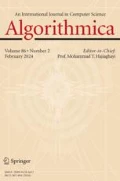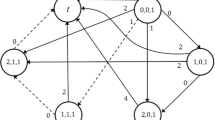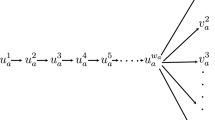Abstract
In this paper we study the single machine precedence constrained scheduling problem of minimizing the sum of weighted completion time. Specifically, we settle an open problem first raised by Chudak and Hochbaum and whose answer was subsequently conjectured by Correa and Schulz. As shown by Correa and Schulz, the proof of this conjecture implies that the addressed scheduling problem is a special case of the vertex cover problem. This means that previous results for the scheduling problem can be explained, and in some cases improved, by means of vertex cover theory. For example, the conjecture implies the existence of a polynomial time algorithm for the special case of two-dimensional partial orders. This considerably extends Lawler’s result from 1978 for series-parallel orders.
Similar content being viewed by others
References
Ambühl, C., Mastrolilli, M., Svensson, O.: Approximating precedence-constrained single machine scheduling by coloring. In: Proceedings of 9th International Workshop on Approximation Algorithms for Combinatorial Optimization Problems (APPROX), pp. 15–26 (2006)
Ambühl, C., Mastrolilli, M., Mutsanas, N., Svensson, O.: Scheduling with precedence constraints of low fractional dimension. In: Proceedings of 12th International Conference on Integer Programming and Combinatorial Optimization (IPCO), pp. 130–144 (2007)
Ambühl, C., Mastrolilli, M., Svensson, O.: Inapproximability results for sparsest cut, optimal linear arrangement, and precedence constrained scheduling. In: Proceedings of 48th Annual Symposium on Foundations of Computer Science (FOCS), pp. 329–337 (2007)
Baker, K.A., Fishburn, P.C., Roberts, F.S.: Partial orders of dimension 2. Networks 2, 11–28 (1971)
Chekuri, C., Motwani, R.: Precedence constrained scheduling to minimize sum of weighted completion times on a single machine. Discrete Appl. Math. 98(1–2), 29–38 (1999)
Chudak, F.A., Hochbaum, D.S.: A half-integral linear programming relaxation for scheduling precedence-constrained jobs on a single machine. Oper. Res. Lett. 25, 199–204 (1999)
Correa, J.R., Schulz, A.S.: Single machine scheduling with precedence constraints. Math. Oper. Res. 30, 1005–1021 (2005)
Dinur, I., Safra, S.: On the hardness of approximating minimum vertex cover. Ann. Math. (2) 162(1), 439–485 (2005)
Goemans, M.X., Williamson, D.P.: Two-dimensional Gantt charts and a scheduling algorithm of Lawler. SIAM J. Discrete Math. 13(3), 281–294 (2000)
Graham, R., Lawler, E., Lenstra, J.K., Rinnooy Kan, A.H.G.: Optimization and approximation in deterministic sequencing and scheduling: A survey. In: Annals of Discrete Mathematics, vol. 5, pp. 287–326. North–Holland, Amsterdam (1979)
Hall, L.A., Schulz, A.S., Shmoys, D.B., Wein, J.: Scheduling to minimize average completion time: off-line and on-line algorithms. Math. Oper. Res. 22, 513–544 (1997)
Håstad, J.: Some optimal inapproximability results. J. Assoc. Comput. Mach. 48(4), 798–859 (2001) (electronic)
Hochbaum, D.S.: Efficient bounds for the stable set, vertex cover and set packing problems. Discrete Appl. Math. 6, 243–254 (1983)
Kolliopoulos, S.G., Steiner, G.: Partially-ordered knapsack and applications to scheduling. In: Proceedings of the 10th Annual European Symposium on Algorithms (ESA), pp. 612–624 (2002)
Lawler, E.L.: Sequencing jobs to minimize total weighted completion time subject to precedence constraints. Ann. Discrete Math. 2, 75–90 (1978)
Lawler, E.L., Lenstra, J.K., Kan, A.H.G.R., Shmoys, D.B.: Sequencing and scheduling: Algorithms and complexity. In: Graves, S.C., Kan, A.H.G.R., Zipkin, P. (eds.) Handbooks in Operations Research and Management Science, vol. 4, pp. 445–552. North-Holland, Amsterdam (1993)
Lenstra, J.K., Rinnooy Kan, A.H.G.: The complexity of scheduling under precedence constraints. Oper. Res. 26, 22–35 (1978)
Margot, F., Queyranne, M., Wang, Y.: Decompositions, network flows and a precedence constrained single machine scheduling problem. Oper. Res. 51(6), 981–992 (2003)
Möhring, R.H.: Computationally tractable classes of ordered sets. In: Rival, I. (ed.) Algorithms and Order, pp. 105–193. Kluwer Academic, Dordrecht (1989)
Nemhauser, G.L., Trotter, L.E.: Properties of vertex packing and independence system polyhedra. Math. Program. 6, 48–61 (1973)
Nemhauser, G.L., Trotter, L.E.: Vertex packings: Structural properties and algorithms. Math. Program. 8, 232–248 (1975)
Paschos, V.T.: A survey of approximately optimal solutions to some covering and packing problems. ACM Comput. Surv. 29(2), 171–209 (1997)
Pisaruk, N.N.: A fully combinatorial 2-approximation algorithm for precedence-constrained scheduling a single machine to minimize average weighted completion time. Discrete Appl. Math. 131(3), 655–663 (2003)
Potts, C.N.: An algorithm for the single machine sequencing problem with precedence constraints. Math. Program. Stud. 13, 78–87 (1980)
Schulz, A.S.: Scheduling to minimize total weighted completion time: Performance guarantees of LP-based heuristics and lower bounds. In: Proceedings of the 5th Conference on Integer Programming and Combinatorial Optimization (IPCO), pp. 301–315 (1996)
Schuurman, P., Woeginger, G.J.: Polynomial time approximation algorithms for machine scheduling: ten open problems. J. Sched. 2(5), 203–213 (1999)
Sidney, J.B.: Decomposition algorithms for single-machine sequencing with precedence relations and deferral costs. Oper. Res. 23, 283–298 (1975)
Smith, W.E.: Various optimizers for single-stage production. Nav. Res. Logist. Q. 3, 59–66 (1956)
Steiner, G.: Single machine scheduling with precedence constraints of dimension 2. Math. Oper. Res. 9(2), 248–259 (1984)
Trotter, W.T.: Combinatorics and Partially Ordered Sets: Dimension Theory. The John Hopkins University Press, Baltimore (1992)
Woeginger, G.J.: On the approximability of average completion time scheduling under precedence constraints. Discrete Appl. Math. 131(1), 237–252 (2003)
Author information
Authors and Affiliations
Corresponding author
Rights and permissions
About this article
Cite this article
Ambühl, C., Mastrolilli, M. Single Machine Precedence Constrained Scheduling Is a Vertex Cover Problem. Algorithmica 53, 488–503 (2009). https://doi.org/10.1007/s00453-008-9251-6
Received:
Accepted:
Published:
Issue Date:
DOI: https://doi.org/10.1007/s00453-008-9251-6




